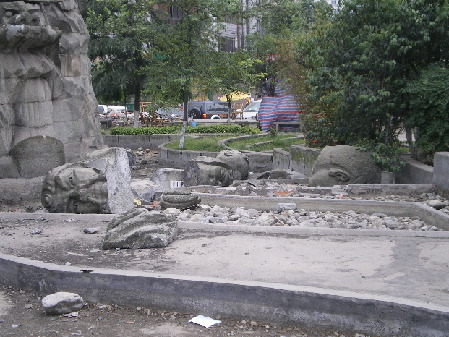Some are not. You can see the pride that the company took in its town from the splendid, brand new gymnasium that stands unscathed in the middle of the destruction. The Primary School alongside it suffered mercifully little damage. The new Dongqi Hotel and the Conference Center also held firm, as did the Community Hospital. But all are now deserted.
The Dongqi area is a very clear example of one of the riddles of the earthquake, something that can be seen wherever it made its deadly presence felt. Some buildings were badly damaged, but stood. Others, identical in age, design and construction, collapsed completely. Why should this be?
As we leave the area, we pass another symbol of civic pride. In a small garden stood a mighty statue, thirty feet high. Signposted "A Brave Han King", it was a representation of Liu Xiu, Han Emperor and founder of Hanwang town, astride his warhorse and surrounded by three of his soldiers. Like the town he founded, the heads of Liu Xiu and his men have fallen, and lie in the dry broken fountain bed beside the statue.

The fall of a great Han Emperor.
We make our way down a kind of alley through towering heaps of rubble. It appears to be the remains of a street; there are crushed cars on the top, which suggests that a bulldozer has pushed its way through to create a path the width of an emergency vehicle.
The destruction is so complete that it is impossible even to tell what kind of buildings these were. It stretches a long way in all directions.
I can see timbers and broken tiles that suggest that some part of the area was old-style single storey bungalows, but the debris is piled so high that there must have been taller buildings too.
At the bottom of the avenue a group of hygiene workers are involved in an animated discussion. Some are clearly senior people in white allover suits and masks. Others are the operatives who can be seen all over the town, a bright blue and yellow drum on their backs, spraying disinfectant.